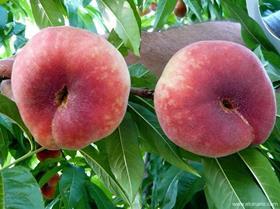
Flat peaches are set to buck the downward trend in Spanish stonefruit production this season, with output expected to increase by 4.8 per cent compared to 2015 to 276,015 tonnes.
The latest forecasts from Spanish cooperative association Cooperativas Agro-alimentarias de España peg the total 2016 crop at 1.599m tonnes. This is 3.6 per cent down on last year’s total but higher than the average for the last five years.
According to the association, plum production is down by 11 per cent, while peaches, nectarines and clingstone peaches are each down by around 5 per cent. In volume terms this equates to a nectarine crop of 528,122 tonnes, a peach crop of 289,715 tonnes and a clingstone peach harvest of 262,107 tonnes. The plum and apricot crops are expected to weigh in at 133,812 tonnes and 109,160 tonnes respectively.
Nationally, the biggest falls will be seen in early production zones like Murcia, Valencia and Andalusia, where freezes at the end of February and beginning of March caused losses in extra-early varieties and the mild winter resulted in a lower production overall.
The two leading production zones in Spain, Aragón and Catalonia, have so far avoided serious frosts. Volumes are expected to register a slight increase compared to 2015 in Aragón, while in Catalonia output is estimated to be down by 2.5 per cent on last year.
According to Javier Basols of Cooperativas Agro-Alimentarias de España, “climatologically there has been a lot of variability in temperatures this year and subsequently we have seen mixed results in blossoming”.
Basols added that the lack of adequate chill hours could affect production of early varieties in these regions, especially in nectarines and peaches.
Nectarines still account for the biggest share of production at 33 per cent, followed by peaches on 18 per cent and flat peaches on 17 per cent. Clingstone peaches, plums and apricots make up 16 per cent, 8 per cent and 6 per cent of total production respectively.
Basols noted that the ongoing closure of the Russian market continued to have serious repercussions in the market. The problem is being exacerbated, he said, because low temperatures across Europe are stalling demand for stonefruit.



